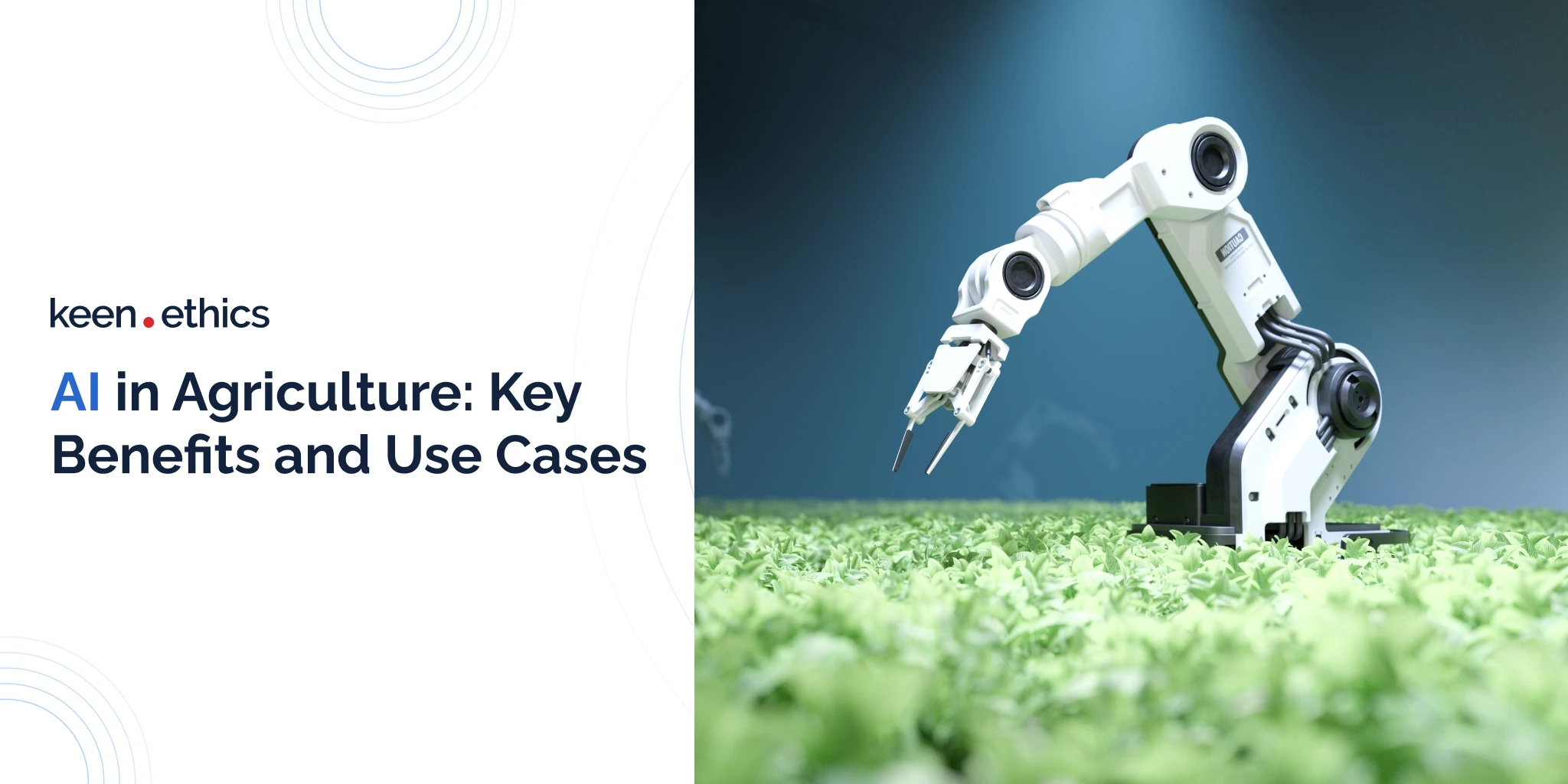AI is a paradigm-changing technology. Learn how to use it for enhancing agriculture in this article!
Artificial intelligence is a technology that’s currently massively changing the world. The key strength of the framework is its ability to analyze vast amounts of information and produce unique output. For example, you can ask machine learning tools to analyze a lot of texts, and they will eventually produce human-like discourse. Agriculture market can also benefit from the technologies of this kind. For instance, they may be used to predict future yields in various fields. In this article, we’ll offer a thorough review of artificial intelligence in agriculture and outline how this technology can assist you.
Existing Statistics About the Impact of AI on Agriculture
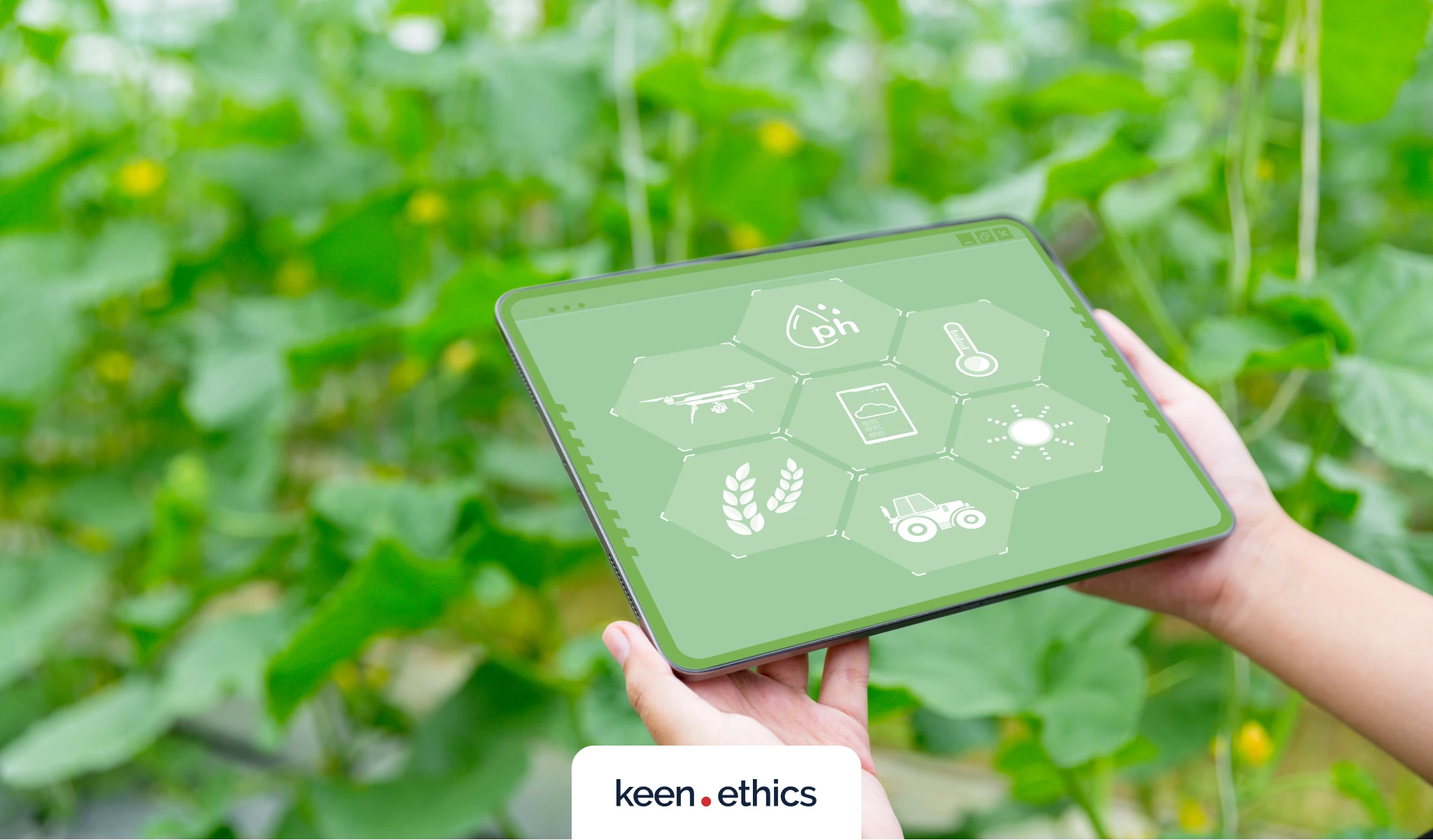
The existing statistics about the impact of AI and software development for agriculture seem to be highly positive. Many companies understand how strong the presented technologies are and what long-term impacts they can exhibit. AI in agriculture enables fields like precision farming, which greatly elevate the relevant crop yields. Ultimately, the data speaks for itself. In 2019, the market for AI in agriculture was at 852 million US dollars. By 2030, it will reach 8.39 billion. The expected CAGR for this growth is 24.8% between 2020 and 2030. Considering this data, we believe that 2024 is the optimal time for making investments in this field.
Key Positives AI Can Bring To Agriculture
Modern AI can bring about many long-term benefits for agriculture. In this regard, multiple technologies are essential when it comes to, for instance, improving crop health.
Making data-centric decisions
The first reason to use artificial intelligence in agriculture includes data-centric decisions. AI relies on large amounts of data and is capable of producing its insights. In this light, the relevant farms can benefit from the use of the technology in many positive ways. Above all, there’s an opportunity to make decisions based on information rather than intuitive insights. Agriculture sector now gets a chance to become completely science-centric, making its management data-driven.
Saving costs
Another important positive of AI in agriculture is the opportunity to save costs. In this respect, AI saves costs in multiple ways. Firstly, its ability to analyze tremendous amounts of data can help improve soil quality and other vital aspects of production. Secondly, AI in agriculture also may help with automating certain machines. Consequently, the need for a workforce performing manual tasks will decrease in the presented case. All these aspects combined are vital for decreasing costs either through improvements in efficiency or, in certain cases, through the focus on automation.
Promoting automation
Artificial intelligence in agriculture is also a perfect opportunity to promote automation. In this regard, the technology in question is used in technological advancements like driverless tractors. Investments into this factor are beneficial from many standpoints. Firstly, you can save costs on the manual workforce. Secondly, there’s an opportunity to reduce potential dangers to workers during certain perilous types of work. Lastly, digital technology often can boost food production due to being more precise. In short, the promotion of artificial intelligence in agriculture is among the best ways to achieve positive results with automation.
Applications of Artificial Intelligence in Agriculture
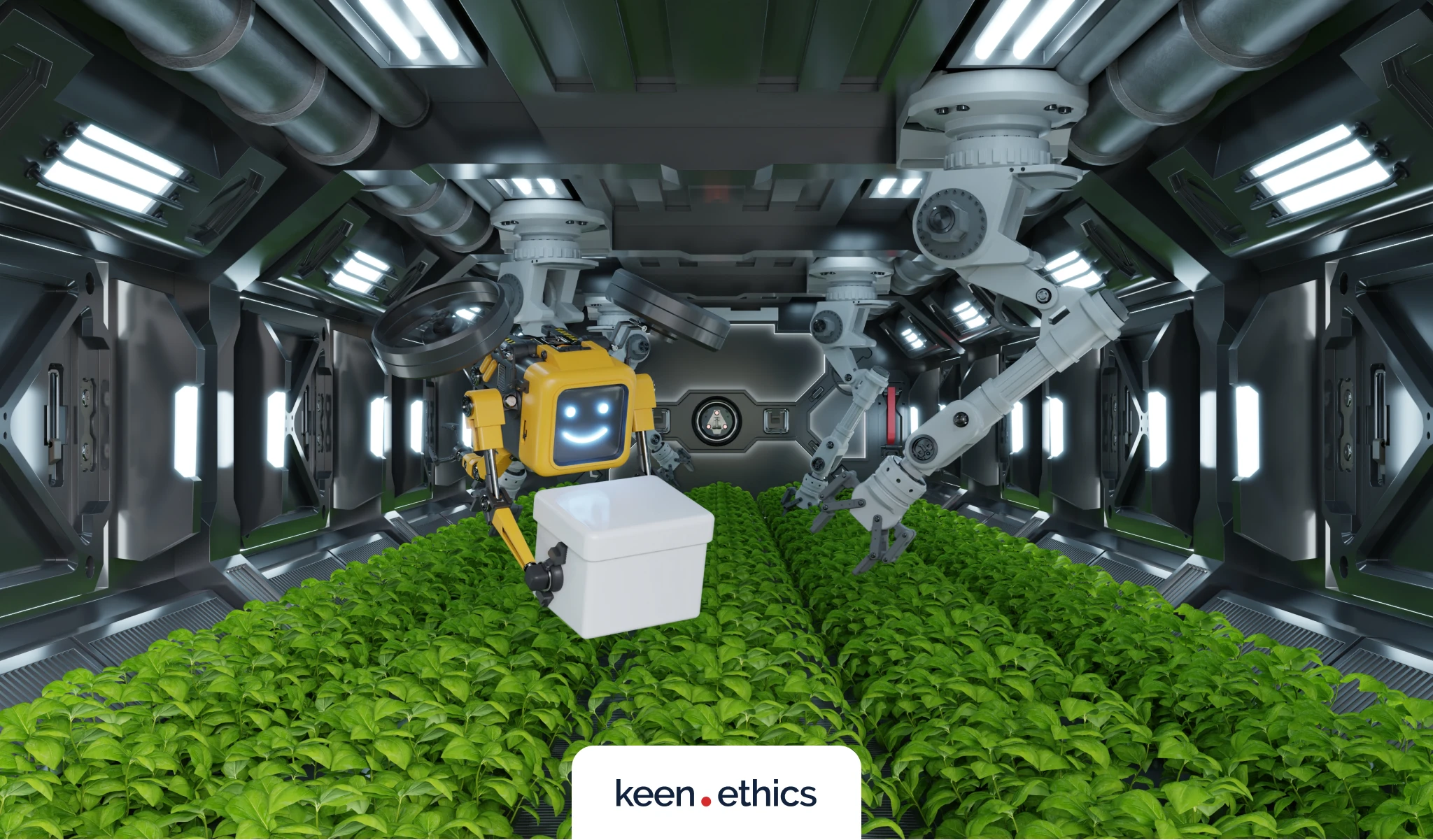
Artificial intelligence can have many high-quality applications in modern agriculture. Let’s look at the benefits digital technology is capable of bringing to your company:
1. Predicting weather
The first reason to use AI in agricultural industry is weather prediction. This technology can analyze weather patterns over many years and make judgments on them. In this respect, the predictions are likely to be more accurate than the ones given by human forecasters. What’s the reason? It’s quite simple: AI is simply capable of analyzing more information than other systems. Therefore, if your goal is to use agricultural software solutions, you should consider investments in the long-term predictions of the weather patterns.
2. Monitoring soils and crops in real-time
Another important application of agriculture projects using AI is undoubtedly the improved monitoring of soils and crops. In this regard, the relevant technologies have many advanced capabilities. Firstly, you should have the ability to collect data from various sensors in an automatic mode. There’s no longer any need for experts to visit certain locations and collect data personally. Secondly, monitoring will occur in an automatic mode, too. What do we mean by this? This information signifies that AI will be able to warn you about negative or positive changes without involving any human labor. All in all, the presented technology enables you to analyze every aspect of soil and crop health without involving large teams of monitoring specialists.
3. Utilizing drones to gather data
AI in agriculture is also capable of working with complex frameworks like drones. In this respect, agriculture software development allows the creation of specialized applications capable of controlling drones. More importantly, this software can then analyze input from those drones. Modern AI frameworks are notable for their advanced visual processing skills. There’s no longer any need for human operators in the agricultural operations. Instead, you can promote a fully automated smart agriculture project that only requires human labor for the most critical and complex tasks. Modern AI can control monitoring tools and even vehicles like tractors, requiring no major input from outsiders. Even irrigation systems may be observed by tools like drones and then controlled by artificial intelligence.
4. Advancing precision farming
Information is among the core elements for enabling all types of precision farming in the modern world. In this respect, artificial intelligence in agriculture, as the sections above show, allows one to collect tremendous amounts of information. It’s possible to have data on weather, chemical conditions of soils, health of the crops, and even visual observations on your fields. In combination, all these types of data can transform our approach to managing crops. There’s a possibility to make every decision in agriculture information-driven. AI in agriculture, thus, becomes essential for precision agriculture. The core element of this approach is its focus on data-centric decision-making. AI-driven tools are essential for enabling such decisions because they simplify the long-term collection of information.
5. Using AI-powered robots
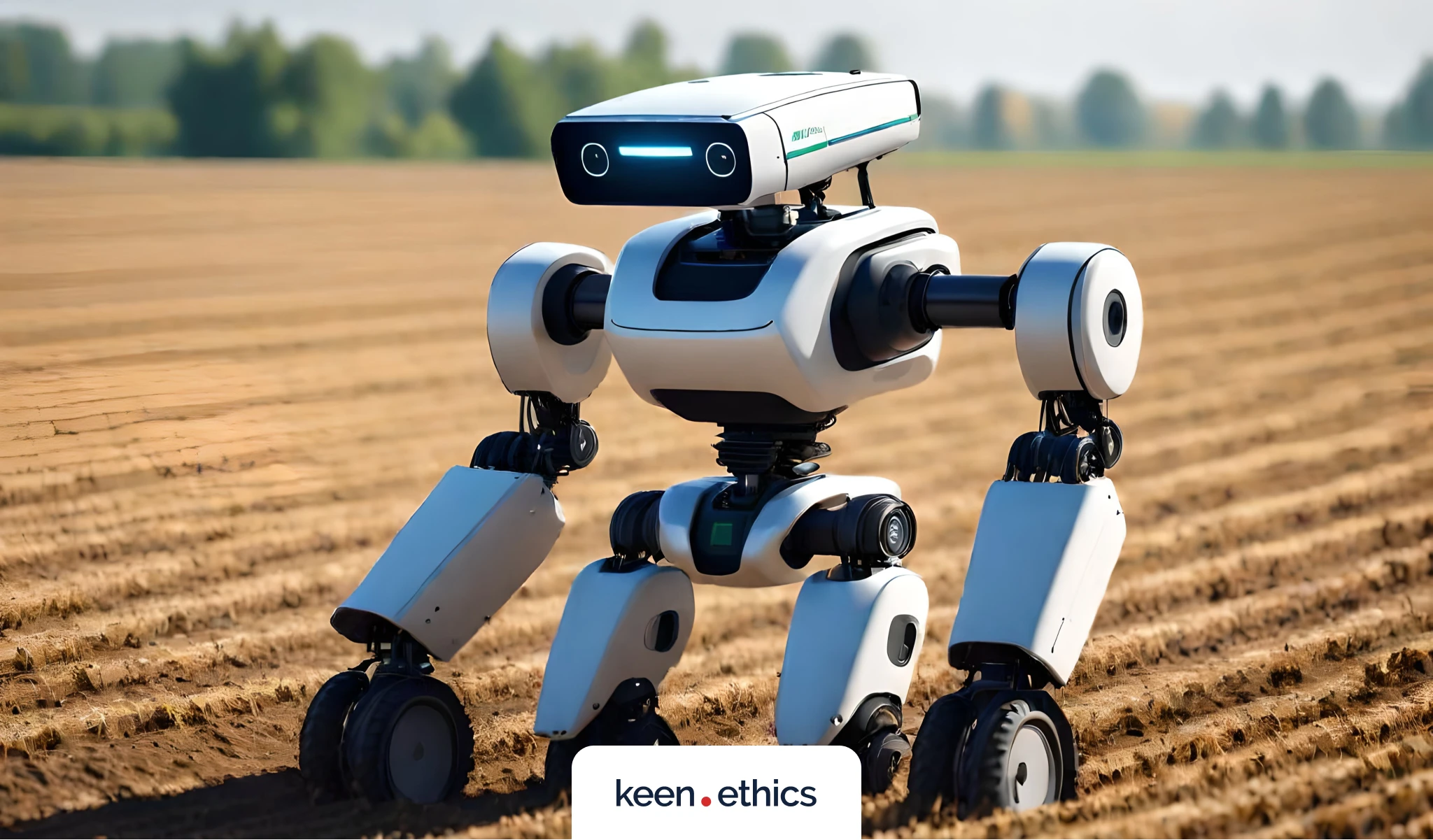
AI in agriculture is a technology that, ultimately, enables the use of so-called AI-powered robots. Many tasks in agriculture are tedious or even dangerous to the workforce. In this light, the most rational choice is to use smart farming tools that can do everything in an automatic mode. For instance, one can spread fertilizers via robots to avoid potential negative effects on the workforce. Robots controlled by AI won’t only remove dangers for the workforce but also advance better soil management practices than humans. Consequently, AI-driven robots will likely become even more popular in the upcoming years. They will offer improved farm yields and, combined with tools like weather forecasting, remove the likelihood of major losses.
6. Advancing AI-centric surveillance systems
Surveillance is essential for farms because there’s sometimes a risk of negative events occurring in them due to outside factors. Wild animals straying into a field can lead to yield loss. There may also be attacks on the cattle from wildlife or even attempts to steal your assets. All this means that AI in agriculture is necessary for security, too. Combined with cameras and other sensors, AI can warn you about negative events as soon as possible. This approach, thus, becomes one more benefit of using the technology in question. Labor shortages among security forces aren’t uncommon because fields are simply too large. Modern AI offers a solution to this problem by automating the majority of the observations.
7. Promoting livestock monitoring
Livestock can encounter many emergencies during the grazing period. Dangers can range from bad weather conditions to attacks from wild animals. AI-based tools exist to help with this problem. You can use them to observe your cattle and intervene in critical situations. For example, if a cow has problems breathing, AIs coupled with sensors will quickly detect this problem. It’ll be very easy to dispatch a team of veterinarians to help them on time. AI in agriculture automates many aspects of cattle monitoring that required direct human intervention in the past.
8. Predicting yields
Many businesses work in conditions where they have to predict yields long before they occur. This factor has to do with the expense of the relevant equipment and other farming resources. Considering that many factors aren’t a given (for example, the productivity of manual labor), farmers often make quite significant mistakes in their predictions. This information means that stronger tools for prediction are necessary in the current conditions. A good example of such tools comes in the form of AI in agriculture. Using various sensors and past information on yields, they can make high-quality predictions about the amount of product you’ll be able to output. With this information, taking loans for business development is much easier and safer.
9. Automating weed removal and harvesting of crops
The final reason to invest in novel technologies is the automation of core field-related activities. AI-based machines are noteworthy for their capability to remove weeds and even harvest crops in a more or less automatic mode. These innovations are essential for situations when you have a shortage of the workforce. More importantly, machines are often more efficient at tasks like water management. Consequently, you can expect better financial outcomes with AI in agriculture than without it.
Key Challenges Stemming From AI In Agriculture
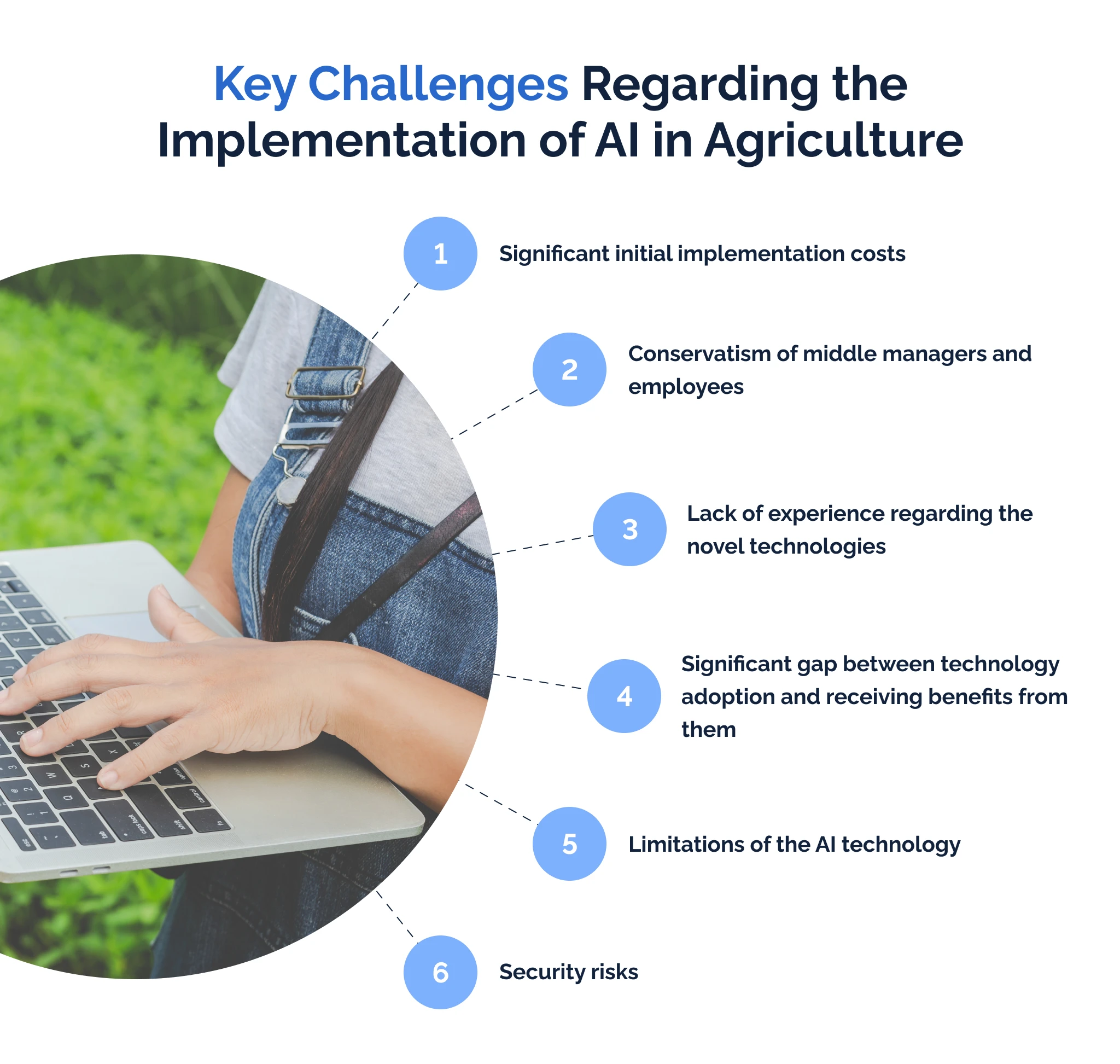
Modern AI in agriculture also offers a set of rather significant challenges for core businesses in the sector. As a result, you have to carefully review the potential problems before implementing the technology in question:
Large initial costs
The first problem of the technology includes large costs you’ll have to pay upfront. AI technology saves funds in the long term but creates quite significant expenditures in the early phases. Not all businesses can implement the innovations of this type. In this light, investment in AI is a serious decision, and you should be sure that it’ll bring about significant long-term positives for you. Here, our recommendation is to primarily look at sensor and analytics frameworks. They don’t look impressive in images but typically bring about some of the greatest benefits.
Resistance from sector insiders
One more problem you’re likely to encounter with AI is the resistance from insiders. In this respect, many individuals may have a negative vision of the technology. Firstly, there’s a tendency to view it negatively due to labor-saving capacities. Many people are afraid of losing their jobs due to AI in agriculture. Secondly, many individuals may be skeptical of the information those systems offer. For instance, they may see it as being too sensitive regarding plant health and diseases.
No practical experience with the technology
Lack of practical experience regarding particular technologies is also one more barrier to the adoption of AI. It’s difficult to perform various operations when your workforce doesn’t know how to work with new technology. AI is a relatively new approach to analysis. Thus, many people may be unsure how to work with these models. This is especially true of AI that doesn’t use text-based generative interfaces. In many cases, configuration for those systems may require input from software development specialists. You should actively review the skills of your workers before focusing operations on modern AI technology.
Long-term adoption process
The adoption of new technologies also proves to be a rather lengthy process. AI needs a lot of time for proper configuration in the majority of cases. For instance, it’s unlikely to work without other automation technologies such as sensors. This means that an average agricultural business should be prepared not only for big investments but also for a rather long time for their fulfillment. Considering that every new technology is likely to disrupt supply chains, there’s always a risk of this long adoption period being too negative for a small or medium business.
Limitations imposed by technology
There’s always a major risk of overstating the benefits of certain technologies. Consequently, one can put too much emphasis on AI during the management of a firm. What are some of the core limitations of AI in the current conditions? Above all, this technology is incapable of automating everything. In one way or another, input from specialists will be necessary at some point. Moreover, AI is capable of making errors. This means that you need to have individuals who are capable of checking its performance. An incorrect judgment on the application of pesticides, for example, may have devastating consequences for all involved decision-makers. Therefore, we recommend investing time into learning about the core strengths and limitations of this innovation, too.
Issues with privacy and security
Lastly, the presented technologies also create some lasting issues with privacy and security. In this respect, a custom solution may be necessary to maximize the long-term safety of your AI innovations. What are some dangers of AI? Firstly, the technology works with tremendous amounts of information. Some leaks may occur during its storage. Secondly, AI-based tools are also complex and, hence, can have rather significant security gaps that aren’t easy to notice. All this means that companies storing a lot of vital personal data may encounter quite significant issues while using this innovation.
Key Reasons to Partner With an AI Software Development Company
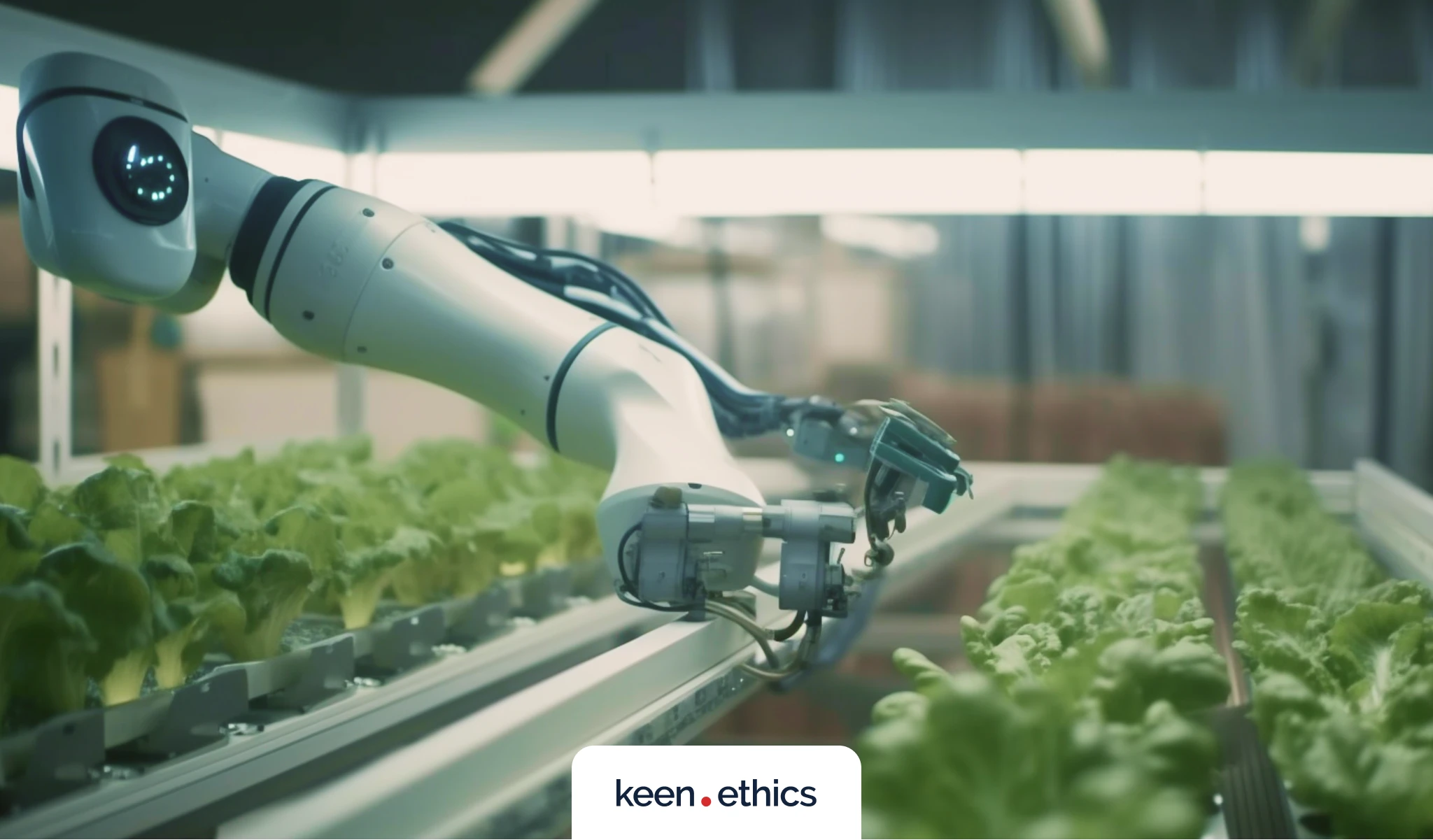
There are many reasons to partner with an AI software development company. The core motivation is the ability to obtain custom software for your firm. This software will help you achieve the goals that are vital for your business. Custom tools target your needs, and not anyone else’s. Keenethics is among the companies that know how to develop such solutions. Thus, you can ask us to create an artificial intelligence tool for your company, too. For example, we know how to create AI copilots for agricultural company management. Our teams are also capable of helping with tools like drone software for agriculture.
Conclusion
To summarize, we believe that investments in AI for the agricultural sector are highly rational. They can improve your yields and help save labor, directing it into the more complex tasks. If you need a solution within this field, our company is ready to help. Our experts know how to create solutions aimed at AI in agriculture. Address us today to start developing a high-quality solution.
FAQs
What advantages does AI in agriculture bring about?
In our opinion, here are some of the core advantages of using AI in agriculture:
1. Promoting precision farming
2. Automating crop monitoring and disease detection
3. Automating all types of machinery and robotics
4. Enabling predictive analytics for yield optimization
5. Creating complex smart irrigation systems
What does SaaS in agriculture stand for?
It’s the usage of subscription services based online within the agricultural field. For instance, you can subscribe to some agriculture AI with the help of modern tools.
What future does AI in agriculture have?
In our opinion, it’s very positive. AI will become more complex, offering even greater analytical capacity.
Keenethics is here to help!

